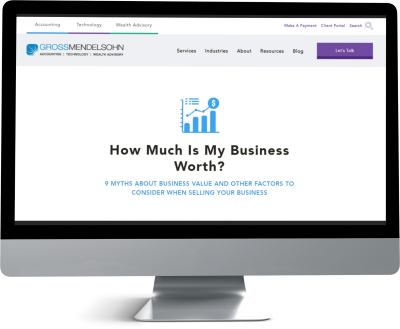The sale of a business is often the most significant financial event an owner faces during his or her lifetime.
Many times, however, the owner begins negotiating the sale without understanding how critical tax aspects of the deal structure can have a huge effect on the net amount of money they’ll receive.
Understanding key factors about your business will result in you being able to negotiate the best deal for you, or at least understand the implications of a deal.
A True Story — How One Business Owner Almost Paid Way Too Much In Taxes
Recently I was asked for advice about a business that was for sale. The company was working with its advisors on restructuring the way various locations were owned in order to better position the company for a sale in three to five years. After reviewing the proposed transaction for this $5 million company, I discovered that the shareholders would have unknowingly generated a tax bill of $2 million on the restructuring of the company. Moreover, they would been hit with a $1 million tax liability as individuals.
In this case, the taxes would have been due, but no cash was being generated to pay them.
Fortunately, the owner was planning far enough ahead for the sale of his business, and we were able to put some things into place to ensure that more money stayed in the owner’s pocket after the sale. Crisis averted!
Planning for the ownership and structure will hopefully minimize the eventual taxes on the sale, or at least defer the taxes until the business is sold.
In this case, the business owner would never have gone forward with the plan as structured if she had fully understood its negative tax impact.
Let’s review four critical issues to be considered when structuring the sale of a business.
1. Are You Selling the Assets of the Business or Its Capital?
This question is the most important starting point in determining the tax consequences of a sale.
If you are selling the capital ownership of a business, here are a few things to know:
-
If you have regular C corporation stock, the gain will be all capital gain and subject to the lowest tax rates. However, most buyers do not want to buy your old company and the potential liabilities related to its operating history.
-
For S corporations, the gain will be capital gain if it is a stock sale.
-
For partnerships or interests, the gain is taxed as capital gain but may be subject to ordinary income tax on depreciated equipment and accounts receivable if you were a cash basis taxpayer.
If you are selling assets, you are left with the most complex issues to deal with tax-wise. This is the structure that most buyers want.
-
Regular C corporations are subject to tax on any gains on the sale inside of the company at ordinary corporate tax rates, and then the shareholders will pay taxes when they liquidate the company after the assets are sold. This is a double tax effect that sellers try to avoid at all costs, as the total taxes could be 60% of the sale price.
-
In S corporations, the sale of assets will be similar to that of a partnership, whereby the gain will be part ordinary and capital gain based upon the allocation of the purchase price amongst the assets of the company being sold.
2. Allocation of Purchase Price
In the sale of a business, the allocation of purchase price is a key factor in determining tax implications. Take a look at the types of assets normally included in the allocation of the purchase price, and the tax impact of each:
-
Accounts receivable will be taxed as ordinary income if you are a cash basis taxpayer. An accrual basis taxpayer does not pay taxes on the portion of the purchase price related to the accounts receivable.
-
Equipment will normally be taxed as ordinary income related to the depreciation taken on it. In most companies, equipment is fully depreciated for tax purposes so most of the purchase price allocated to equipment is taxed as ordinary income.
-
Real estate will normally be taxed as a capital gain except to the extent of depreciation taken, it will be subject to a higher 25% special depreciation tax rate.
-
Goodwill will generally be viewed favorably from both the buyer’s and seller’s perspective. It’s one of the best places for a buyer and seller to agree to an allocation of purchase price since the buyer can depreciate goodwill over 15 years and gets to report the gain as a capital gain.
-
Covenants not to compete are fine from a buyer’s perspective, since they can be written off over 15 years, similar to goodwill. However, the covenant is not favorable to a seller who reports the covenant not to compete as ordinary income.
3. Alternative Forms of Payment
Consider the tax implications of alternative forms of payment.
-
The buyer taking back financing from a sale (often reported as an installment sale) is generally favorable to both parties since the buyer can defer much of the gain until the cash is received. One special rule increases the tax on the installment sale when the deferred sale price is over $5 million.
-
A contingent portion of a sales price allows a seller to defer a portion of the proceeds and the taxes until the contingency has passed and the funds are received. This type of structure could be an installment sale, or proceeds could be reported as the contingency is realized if it is unlikely that the contingent payments will be realized.
-
You could do a tax-free exchange where assets of the business can be exchanged for assets of another business tax free. This might be especially beneficial when the majority of the sales price of a business is related to real estate used in the business. Alternative investment rental real estate could be found and exchanged as an alternative to a fully taxable sale of the real estate in a business.
-
Selling the company to an ESOP (Employee Stock Ownership Plan) allows a seller to potentially roll over the proceeds to regular investments assets and defer paying taxes on the proceeds.
-
If your business is a qualified small business stock company, you might be eligible to rollover the proceeds from a sale to another qualified small business stock company.
4. Avoiding Double Taxes
Avoiding double taxes is one of the most significant issues facing a sale of a regular C corporation or an S corporation subject to the built-in gains tax rules.
You can use several planning techniques to reduce the double taxes.
-
One of the hottest areas of planning for the sale of a business is the ability to allocate a portion of the goodwill from a business sale to the key owner of the business. A business valuation and detailed analysis of the business is required to be able to sustain this allocation of purchase price.
-
A covenant not to compete is ordinary income to the seller, but is only subject to one level of tax to the owner
-
If an individual has created patents or other intellectual property in his individual name, you have the potential to allocate the purchase of that intellectual property directly to the individual that owns the patent.
When Should Planning Begin?
Planning for the sale of your business should begin not when you enter into negotiations to sell, but when you form the company.
Even then, your structure should be regularly reviewed over the life of the company. Although you are, in reality, mostly stuck in the tax structure that was chosen for the business, there are many opportunities to minimize the tax consequences of a sale, for even the worst business tax structures.
But remember, the buyer does not have the same objectives as you do, and an understanding of the buyer’s goals along with the available tax minimization strategies is critically important to get the desired result when selling your business.
And of course, this does not even address the most important issues of negotiating a sales price and related payment terms.
Not sure where to start with exit planning? Our Business Exit Planning Checklist can help.
Need Help?
Contact us online or call 800.899.4623.
Editor's note: this article was originally published in 2014. It was updated with new information in 2021.



